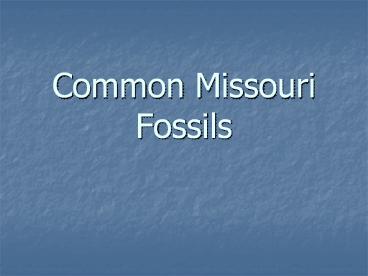Common Missouri Fossils PowerPoint PPT Presentation
1 / 24
Title: Common Missouri Fossils
1
Common Missouri Fossils
2
Trilobites
- Trilobites are extinct sea creatures that were
one of the first forms of life on earth. They
ruled the world before the time of the dinosaurs.
3
What do you think Trilobites are related to?
4
Trilobites Today
- Their closest living relative today is the
horseshoe crab. - They are also related to the lobster and crab.
5
Fern Fossils
- The fern fossil records extend back 400 million
years ago. - Ferns live in a wide range of habitats, ranging
from the tropics to cold temperate regions.
6
Are ferns the same today as they were 400 million
years ago?
7
Modern Ferns
Yes. Did you know that ferns have leaves,
called fronds, which usually consist of leaflets.
8
Crinoids
- Crinoids resemble flowers, with their cluster of
waving arms on a long stem. They are sometimes
called sea lilies. - Crinoids are not plants. They are animals that
have lived in the world's oceans more than 490
million years ago.
9
What are modern Crinoids?
10
Crinoid relatives
- Modern day relatives are starfish, sea urchins,
sea cucumbers, and feather stars.
A Passion Flower feather star
11
Ancient Gastropods
- Gastropods are the most diverse and abundant type
of mollusks, with nearly 35,000 living and 15,000
fossil species identified so far. - Gastropods include snails, slugs, conchs, whelks,
and limpets.
12
What are modern gastropods?
13
Modern Gastropods
- Present day relatives are both marine and land
snails and slugs.
14
Fossil Bivalves
- Bivalves are among the oldest fossils from more
than 500 million years ago.
15
Do you have any idea what modern Bivalves are?
16
Modern Bivalve
- Bivalves are mollusks.
- They have two shells that are right and left
handed which are asymmetrical.
17
Fossilized Fish
- Fish are the most abundant of all living
vertebrates and make up more than half of the
approximately 48,500 species with us today! - Fish are rare as fossils because the fragile
nature of a fish body makes it a poor candidate
for fossilization (except shark's teeth).
18
How do you think fish have changed over time?
19
Modern Day Fish
20
Mastodons
- Mastodons were leaf eaters with multi-cusped
teeth. - Mastodons became extinct approximately 11,000
years ago. - Mammoths were larger and had teeth adapted
primarily for grazing (eating grasses).
21
Was the Mastodon the same as the Mammoth?
22
Modern Day Mastodons
- Mammoths were larger and had teeth adapted
primarily for grazing (eating grass). - Closest modern day relative is the elephant.
23
Now - Compare the Old to the New
24
Compare the Old to the New

